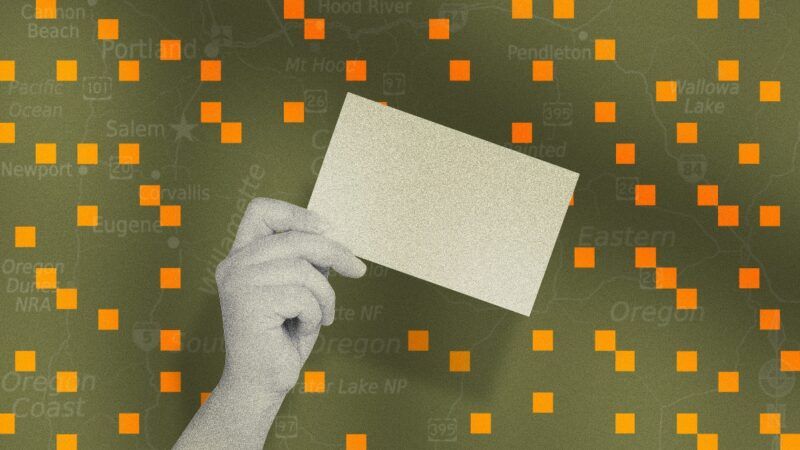Oregon Voters Will Decide Whether To Embrace Ranked-Choice Voting
Will the Beaver State join Maine and Alaska?

Oregon citizens will soon have the chance to shift their elections to a ranked-choice voting system. On Sunday, Oregon's legislators approved sending H.B. 2004 to the voters in 2024. If the referendum passes, federal and statewide elections will shift to a ranked-choice system. Counties and cities will also be permitted to implement ranked choice for many local elections.
On ranked-choice ballots, voters don't just choose one candidate for office (though they can if they want). Instead, they rank candidates in order of preference. To win a ranked-vote election, a candidate must receive more than 50 percent of the vote. If no candidate wins a majority in the first tally, the votes are tallied again, but the candidate with the fewest votes is excluded. For voters whose first choice was the ejected candidate, their second choice becomes their vote in the second tally. This process continues until one candidate gets a majority of the vote.
Ranked-choice voting has been adopted in Maine, Alaska, New York City, and other locales. FairVote, a non-profit that advocates for implementing ranked-choice voting systems, has a map here.
If voters approve, Oregon will be the first state to implement ranked choice with the legislature's support. In Maine and Alaska, it was implemented via ballot initiative, and in Maine, it had to overcome significant legal resistance from some Republican politicians. In Alaska, the implementation of ranked-choice voting led to the election of the first Democrat in 50 years to Congress. That's because Republican candidate Sarah Palin is such a divisive figure even in her state that many voters who top-ranked another Republican candidate (Nick Begich) declined to choose Palin as their second choice. As a result, Democrat Mary Peltola won the seat, prompting Palin and some other Republicans to attack ranked-choice voting's legitimacy. Lawmakers in Florida and Tennessee have banned ranked-choice voting in their states (in Tennessee's case, overruling the will of Memphis voters who supported it).
But lest anybody think it's just Republicans opposed to a particular election system, you'll find opposition in places where one party's operatives have much control over which candidates are put before the voters. In New York City, prominent Democratic leaders attempted to stall the implementation of ranked-choice voting that citizens approved in 2021. Before Eric Adams was elected mayor, he criticized ranked-choice voting.
And in Washington, D.C., the local Democratic Party also rejects using ranked-choice voting for city elections. Party leadership voted against it in 2021, and they rejected it again earlier this year, putting out a statement that said, in part, "Our priority is to ensure that every vote is counted and that the voice of each voter is accurately represented, without introducing additional complexities that could hinder voter engagement and participation."
But there's little evidence that ranked-choice voting hinders voter engagement and participation. FairVote notes New York City saw its highest turnout in 30 years when ranked-choice voting debuted in its 2021 primaries. The group points to several other locations that saw increased turnout after implementing ranked-choice voting. Voters who have filled out a ranked-choice ballot say they are not confused by the system.
Ranked-choice voting gives some teeth to voters who don't want to support divisive candidates or campaigns propped up by the machinations of local party officials. It is not some electoral silver bullet. Nothing is. But the goal of ranked-choice voting is to elect candidates most voters are willing to live with. Not for nothing, the system also allows voters to support third-party candidates without worrying that they're throwing their votes away.


Show Comments (75)